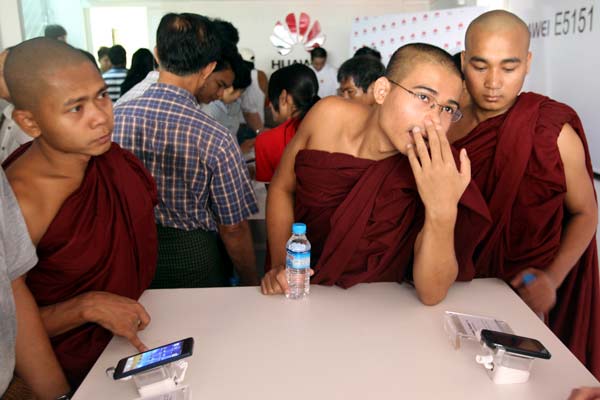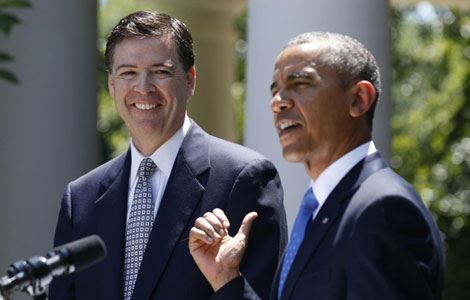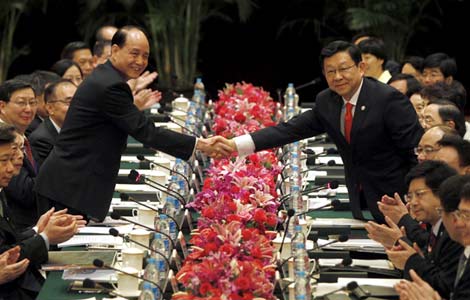Chinese telecom companies call on Myanmar
Updated: 2013-06-21 03:15
By Qin Zhongwei in Yangon (China Daily)
|
||||||||
|
 |
|
Even monks were not immune to the excitement when Huawei's showroom opened in Yangon, Myanmar. The company's handsets are the most popular in Myanmar, garnering a market share of more than 60 percent. The company plans to open 40 to 60 flagship showrooms in the country this year, offering smartphones and other high-tech products. Zhang Wei / China Daily |
Huawei, others aiming to boost one of the most underdeveloped markets in Asia
Chinese telecom companies are enthusiastic about Myanmar's efforts to boost its underdeveloped telecom market, said a high-level manager at the Myanmar branch of a top Chinese telecom company.
"The inflow of top telecom operators from all over the world creates a brilliant opportunity to upgrade the country's telecom sector," said Ren Geng, managing director of Huawei Technologies in Yangon.
Huawei is now the world's second-largest provider of telecommunication gear and mobile phones. It has established an excellent cooperation model with the world's major operators and it can replicate the successful model in Myanmar, he said.
After spending a decade cultivating the Myanmar market for 10 years, Huawei opened its first flagship showroom in downtown Yangon in early May. It attracted huge attention from local consumers and media.
Huawei's handsets are the most popular brand in Myanmar, garnering a market share of more than 60 percent. The mission for the company's Myanmar branch this year is to open 40 to 60 flagship showrooms around the country, which will provide smartphones and other high-tech products, Ren said.
Though it has a population of more than 60 million, the number of telecom customers in Myanmar is comparatively low at about 3.5 to 4 million, which is why the Myanmar market is so lucrative to international companies, experts said.
"Basically the only way to go with telecoms in Myanmar is up. This is one of the last remaining untapped markets," said a Bangkok-based telecom analyst in a Financial Times story.
Thomas Liu, managing director in charge of Huawei's Southeast Asia region, expects the number of mobile users in Myanmar to reach 30 million within five years, based on its young population.
But the growth in numbers will not be easy without making the dream of owning a handset cheaper and more affordable. It costs $200 to buy a SIM card in Myanmar.
In late May, the Myanmar telecom regulator announced that it was selling 350,000 SIM cards for the price of K1500 (around $2). As a tentative step in telecom reform, the cards were sold lucky-draw style.
In the case of Mandalay, Myanmar's second-largest city, local residents began lining up at 5 am and waited as long as three hours to get their hands on the much cheaper card.

 Obama nominates new FBI director
Obama nominates new FBI director
 Lucky winners get 'best jobs'
Lucky winners get 'best jobs'
 'Americans In China' fashion show
'Americans In China' fashion show
 In with old and in with new
In with old and in with new
 Pact to boost cross-Straits service trade
Pact to boost cross-Straits service trade
 Foreigners in Tianjin find a fresh goal to aim for
Foreigners in Tianjin find a fresh goal to aim for
 LeBron leads Heat to second straight title
LeBron leads Heat to second straight title
 Singapore haze at worst yet, schools shut
Singapore haze at worst yet, schools shut
Most Viewed
Editor's Picks

|

|

|

|

|

|
Today's Top News
US diplomat lays out vision for East Asia
China in $270b oil deal with Russia
Pact to boost cross-Straits service trade
'Goodwill' voiced in solar row
US files charges against Snowden
Economic confidence levels drop
Major source for Beijing water plan 'polluted'
Foreigners in Tianjin find a fresh goal to aim for
US Weekly

|

|







